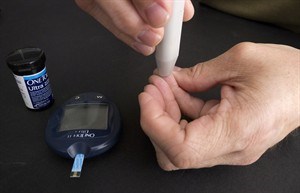
A lancet device (top) is shown being used to prick a finger to draw blood to be tested in a glucometer (left). THE CANADIAN PRESS/Graeme Roy
June 11, 2012 - 3:52 PM
TORONTO - Long-term use of daily insulin injections does not appear to increase the risk of heart attacks, strokes and cancer in people with Type 2 diabetes or pre-diabetes, a major Canadian-led international study concludes.
The study could put to rest a decades-long debate as to whether insulin leads to cardiovascular disease and some cancers in people who take the shots to control high blood sugar levels caused by Type 2 diabetes or its precursor.
"People have been debating the question of whether there are adverse consequences to long-term insulin use for years," said principal investigator Dr. Hertzel Gerstein, a professor of medicine at McMaster University. "This study provides the clearest answer yet to that question: No, there are not."
Gerstein said the study results apply only to people with Type 2 diabetes and pre-diabetes; the study did not include patients with Type 1 diabetes, who typically take different doses and forms of insulin over the course of a day.
More than nine million Canadians have diabetes or pre-diabetes. With Type 1 diabetes, the pancreas stops making insulin, requiring life-long injections; with Type 2, the pancreas does not produce enough insulin or the body cannot properly use the insulin it does make. This leads to high levels of glucose in the blood that can damage organs, blood vessels and nerves.
The ORIGIN study, led by Gerstein and McMaster colleague Dr. Salim Yusuf, included more than 12,500 people in 40 countries at high risk for, or in the early stages of, Type 2 diabetes. Participants were randomized to either one daily injection of the long-acting insulin glargine or to no insulin for an average of six years.
Researchers found no difference among the two groups in cardiovascular outcomes or in the development of any type of cancer, suggesting that daily insulin to control blood-sugar levels is not harmful over long periods of time.
"We showed clearly and without any questions that there is a totally neutral effect on serious long-term problems," Gerstein said Monday from Philadelphia, where he was presenting the results to a meeting of the American Diabetes Association.
As a doctor, Gerstein said he will have no qualms about prescribing daily insulin injections and now can confidently reassure any patient worried about possible repercussions from the drug down the road.
"I can look you right in the eye and say this has been studied and carefully looked at and there's no evidence at all that this will increase your risk of serious long-term disease, such as heart attack, cancer, et cetera," he said.
In a second key finding, researchers found that people with pre-diabetes who received daily insulin injections had a 28 per cent lower chance of going on to develop Type 2 diabetes, even after the injections stopped.
That suggests that some people who start insulin injections won't necessarily be looking at treatment for the rest of their lives, said Gerstein.
The study, which is also being published in the New England Journal of Medicine, confirmed the presence of two previously known side-effects of insulin: potential low blood sugar and minor weight gain.
Gerstein said about half of the 6,000-plus participants randomized to get daily insulin shots experienced episodes of low blood sugar, or hypoglycemia; overall, participants taking the drug gained an average of 3.5 pounds over the six-year period.
As well, one death was attributed to hypoglycemia in a participant who was on insulin injections.
News from © The Canadian Press, 2012